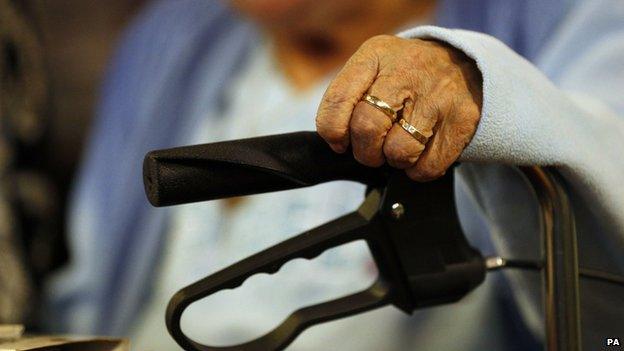Thousands of care workers 'miss out on minimum wage'
- Published

More than a tenth of UK care workers are being paid less than the national minimum wage of £6.50 an hour, a study suggests.
The Resolution Foundation think tank says its research indicates that about 160,000 people are losing out on an average of £815 each a year.
It said some firms wrongly did not pay staff when they travelled between clients, on training or when "on call".
Ministers said they were taking action against employers who broke the law.
The national minimum wage is paid to adults aged 21 and over and there are lower rates for younger workers and apprentices.
The minimum wage regulations, external say working time includes travelling in connection with work, and training or travelling to training during normal working hours.
The Resolution Foundation, a not-for-profit research organisation, said the problem it had uncovered was "primarily down to the failure of employers to pay staff at a level that adequately covers all of their working time".
The care industry sector, which employs about 1.4 million people in the UK, has long been associated with low pay, while funding cuts and an ageing population is creating an additional strain on wages, it added.
The Resolution Foundation said the total amount that care staff were missing out on was estimated to be about £130m a year, but it could be higher. This is because the study did not take account of illegal deductions to pay which it said was "the most common reason for non-compliance" with the minimum wage regulations.
It is calling on national and local government as well as social care providers to address its concerns.

Case study: 'I cannot teleport myself'
"I have been a care worker for five months. I can make up to 15 visits a day, sometimes seeing the same client several times a day.
I am on a zero-hours contract but generally get seven shifts a week, from 6am to 2pm or 2pm to 11pm.
I work 56 hours but only get paid for 27 hours. I am only paid for the length of time I am with the client.
I don't get travel time. Mileage is covered at 20p per mile but not if there is more than an hour between appointments. I don't understand this as it's not like we cannot teleport ourselves to the next client.
I get paid between £7 and £8.40 an hour. If I were paid for the average 56 hours I am out for, I would earn £1,680 every four weeks, instead I am earning £810.
My friend and I worked out that we are basically earning about £3 an hour.
I enjoy my job and I like face time with my clients. It is not just this company, it's all companies. They don't have the funding to be able to pay us properly."
Anonymous, 23, from Wakefield

Laura Gardiner, a policy analyst at the Resolution Foundation, said: "Diminishing public funding and ever tighter commissioning practices are placing great pressure on care providers, but there is simply no excuse for breaking the law."
"As well as helping to attract and retain staff and boosting the incomes of low-paid workers, better pay would ultimately lead to improvements in care quality."
TUC general secretary Frances O'Grady said it was "criminal" that care workers were not being paid their full entitlement.
"Our social care system is in crisis because of huge cuts to local authority budgets, with many councils outsourcing services to the cheapest bidder," she said.
"Without extra funding the care sector will continue to be a haven for zero-hours contracts and Victorian-style employment practices."

Current UK National Minimum Wage rates
Adult rate (21 and over) - £6.50 per hour
18 to 20-year-olds - £5.13 per hour
16 to 17-year-olds - £3.79 per hour
Apprentice rate - £2.73 per hour

Colin Angel, of the UK Homecare Association, which represents providers, said they operate in a market where purchasers, largely local councils, "face unprecedented spending constraints".
"HMRC have a responsibility to investigate and, where appropriate, take action against employers which do not pay the national minimum wage," he said.
"However, we repeat our calls for commissioners to take the actual costs of care services into account when letting contracts to the independent and voluntary sector, and for government to ensure independent oversight of the practices of social care commissioners."
A spokesman for the government said: "It is not only unacceptable to pay less than the minimum wage, it is against the law.
"We are taking action to make it easier to name, shame and fine offenders, as well as helping social care workers to recover the hundreds of thousands of pounds in pay owed to them.
"We are also looking at what more we can do to make sure social care workers are paid fairly in the first place."
- Published15 January 2015

- Published19 January 2015

- Published28 July 2015

- Published17 January 2015

- Published15 January 2015

- Published2 November 2014
